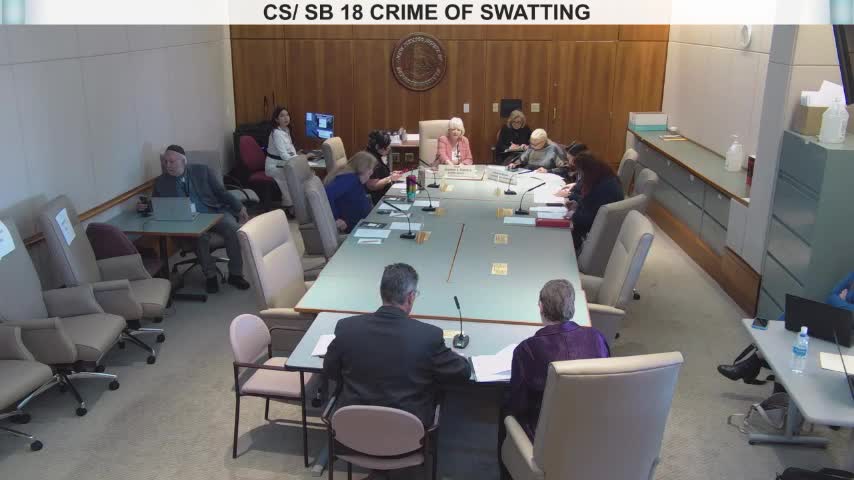House committee advances bill to make 'swatting' a fourth-degree felony
Get AI-powered insights, summaries, and transcripts
Subscribe
Summary
The House Consumer and Public Affairs Committee on Oct. 12 heard testimony on Senate Bill 18, which would make "swatting"—knowingly calling in a false report to a public-safety agency to prompt an immediate response—a fourth-degree felony when the caller intends to cause such a response.
The House Consumer and Public Affairs Committee on Oct. 12 heard testimony on Senate Bill 18, which would make "swatting"—knowingly calling in a false report to a public-safety agency to prompt an immediate response—a fourth-degree felony when the caller intends to cause such a response.
Senator Brandt, who presented the bill to the House panel, told members: "If you don't know what swatting is, it's actually fairly simple. It's calling in a false report to 911 or directly to the police station to try to get a response really by the team, which is why it's called swatting." Brandt said the tactic can be deadly, citing national incidents and a recent Farmington case in which a homeowner was shot after police forcibly entered a residence following a false report.
Why it matters: Supporters said the bill targets callers who deliberately seek to trigger an armed police response, a practice they described as increasingly common and dangerous for residents and officers. Adrian Gomez of the Greater Albuquerque Chamber of Commerce told the committee, "Nothing is more terrifying to a student than to be threatened with violence, especially our youngest and most vulnerable. Swatting is a form of violence and intimidation ... making swatting a felony is what we should do for our children." Gomez's testimony was given remotely over Zoom.
Key provisions and sponsor explanation: Under the committee substitute explained by Brandt, ordinary false reports could remain a misdemeanor, but subsection (b) would make it unlawful for a person to knowingly make a false or misleading report of an ongoing emergency or threat of violence to a public-safety agency with the intent to cause an immediate response; that conduct would be a fourth-degree felony. Brandt said the measure focuses on callers who aim to provoke a high-risk law-enforcement response (commonly described as a SWAT response), not on ordinary mistaken or low-level false reporting.
Support and examples: Committee members heard examples of how swatting has targeted public figures, online streamers and ordinary residents, including incidents where callers used burner phones and fabricated active-shooter or domestic-violence scenarios. Brandt told the committee that 45 other states have enacted swatting statutes and that the proposal narrows prior language to focus on callers who intend to prompt an immediate response.
Concerns and clarifying questions: Several lawmakers pressed the sponsor on the bill's mens rea and scope. One member asked why language requiring that the caller "know" the report was false was modified; Brandt and other supporters said the substitute already contains "knowingly" in the subsection aimed at swatting and that the change was intended to avoid redundant phrasing. Lawmakers also voiced worries the felony provision could sweep in prank callers or young people and asked whether prosecutors would be likely to bring felony charges if no emergency response occurred. Brandt said prosecutorial discretion and high proof thresholds (intent and knowledge) should limit overreach, and that prosecutors and judges can decline or dismiss inappropriate felony prosecutions.
Process and motion: After discussion, a committee member moved a "due pass" recommendation on SB 18 and another member seconded the motion. The transcript records the motion and second but does not record a roll-call or final vote in the committee hearing record provided.
What was not resolved or not specified: The committee hearing and the record provided do not show a recorded tally or the names of the mover and seconder. The transcript also notes prior related legislation (House Bill 8) that addressed shooting-threat provisions and was handled separately; the substitute before the committee was described as focusing solely on the swatting provision.
Background and context: Brandt said the swatting portion of the package has been part of his efforts for several years and that the bill was amended in Senate Judiciary before arriving in this House committee. Committee members referenced national examples and online incidents affecting elected officials and content creators.
Next steps: The hearing record shows the committee moved a due-pass recommendation; the transcript does not include the committee's vote or further floor scheduling.
Ending: Committee members left unresolved questions about how broadly the felony standard would be applied in practice and whether existing prosecutorial safeguards would prevent inappropriate felony charges for prank calls or confusing domestic-violence reports. The committee advanced the bill for further processing pending a recorded committee vote not included in the provided record.
